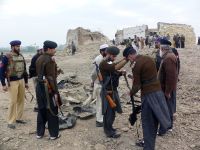Israel condemned Sunday the "language of threats" which emerged from the emergency Arab summit in Cairo, Prime Minister Ehud Barak's office said. It also called for a "time-out" in the peace process.
"Israel utterly rejects the language of threats used at the Arab summit in Cairo and condemns the call for continued violence against it," Barak's office said in a statement.
It called on the Palestinians "to honor their commitments to halt the violence and incitement, and to immediately restore calm and order before there is -- heaven forbid -- an additional escalation."
It said Israel "continues to strive for peace while uncompromisingly defending its vital security interests and will continue to act to foster reconciliation between it and the Arab world, but not at any price and not under pressure of violence."
Barak also called for a "time-out" in the peace process, following the Arab summit.
"Following the Arab summit and in light of the results, we are obliged to proceed with a time out, the objective of which is to proceed with a re-examination of the political situation, in light of the events of recent weeks," the statement said.
The prime minister said his decision, which he hinted did not have the full backing of his cabinet, was justified by the failure of the Palestinians to implement the accords reached at the earlier US-sponsored Sharm el-Sheikh summit.
"There have been numerous time outs of this kind during the last decade, on our part as well as the other side," he said. "It's not new. But it's a necessary measure which does not require a government decision."
The announcement followed earlier official statements praising the summit host, Egyptian President Hosni Mubarak and hailing the meeting's final resolutions as "a victory of wisdom."
Barak "appreciates Egyptian President Mubarak's considerable effort to maintain a balanced approach, which calls for peace and restraint, as opposed to the extremists' position," his office said.
Israeli government spokesman Nachman Shai said, "I think that for the time being, it looks as if this is a victory of wisdom in the Arab world, that those countries, especially Egypt and Jordan who maintain diplomatic relations with Israel did decide strategically to proceed with that peace."
In Cairo, Palestinian minister Nabil Shaath branded the move a "new escalation."
"Barak, who had praised the wisdom of the Arab summit, then announced a time out in the peace process and opted for war and aggression, and he alone bears responsibility for all that," Shaath said.
"It's a new escalation for which he must assume responsibility," Shaath said.
Palestinian chief negotiator Saeb Erakat called it "a slap in the face."
Barak's chief security adviser, Danny Yatom, justified the "time out," giving the assurance that the government "will continue to use all means to achieve peace, which remains our strategic objective."
Shai, too, attempted to justify Barak's decision.
"The 'time out' indicates that we are reviewing our position" relating to the Palestinians, Shai said. "But it does not indicate that we are going to end our support of the peace process."
Barak first announced his intention to pause the peace process on national television on Friday, after a day in which nine Palestinians were killed in the ongoing violent unrest, which has rocked the Middle East for the past three weeks, leaving some 130 people dead and 4,000 injured - JERUSALEM (AFP)
© 2000 Al Bawaba (www.albawaba.com)







